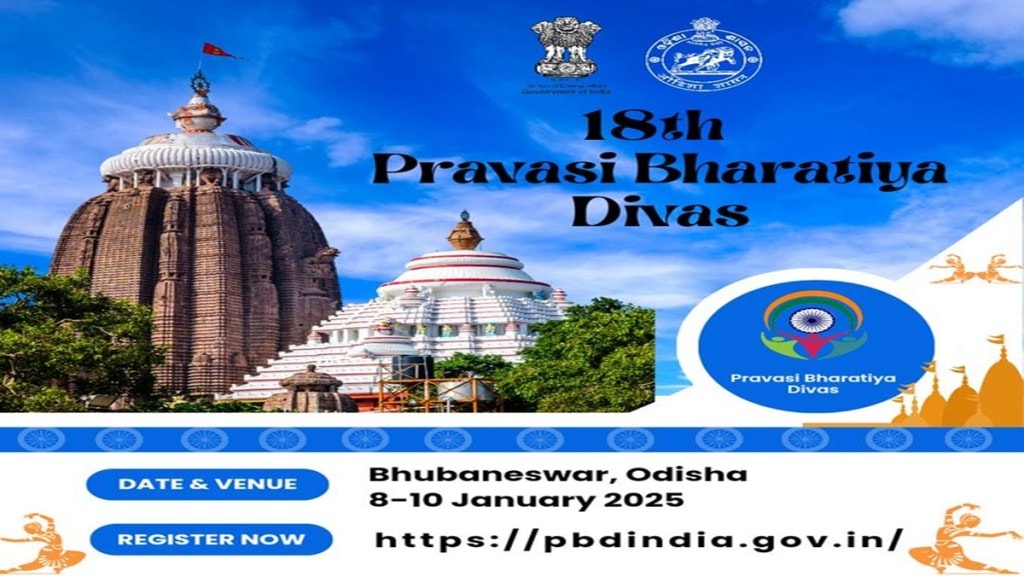By Subrat Tripathy
The 18th Pravasi Bharatiya Divas (PBD) convention to be held in Bhubaneswar from January 8-10 perhaps gives us an opportune moment to look at the Indian diaspora and evaluate its true potential in giving shape to the Prime Minister’s dream of a Viksit Bharat.
Estimated to be the world’s largest, the Indian diaspora with 35.42 million people residing outside India as of November 2024 includes 15.85 million NRIs and 19.57 million PIOs. It has a significant impact on India’s economy, contributing around 3.5% of the country’s GDP through remittances. In 2023, India retained the top spot with remittances of $120 billion, nearly two times ahead of Mexico ($66 billion) and China ($50 billion). Remittances are critical for any country since they help cushion the adverse impact of any fall in foreign direct investment and higher trade deficit. For India too, the steady flow of remittances has been hugely beneficial and it is estimated to top $124 billion in 2024 and touch $129 billion in 2025.
Apart from the sheer numbers, what also works in India’s favour is the diverse composition of these remittance inflows which is predicted to provide steadiness in case of economic downturns. The United States, United Kingdom, and Singapore, which collectively account for 36% of total remittance flows to India, are the primary destinations for highly skilled Indian migrants in the IT and services industries. The UAE accounted for 18% of India’s remittance flows while Saudi Arabia, Kuwait, Oman, and Qatar, collectively accounted for 11% of India’s total remittances.
The diversification of India’s migrant pool, between a large chunk of highly skilled migrants working in high-income OECD markets and less skilled migrants in the GCC markets, could impart stability to remittance inflows in the event of external shocks.
Leveraging Connections
Based on the theme “Diaspora’s Contribution to a Viksit Bharat”, the PBD convention is expected to witness 7,500 participants, including NRIs from more than 50 countries. The Pravasi Bharatiya Samman Awards will be conferred by the President of India.
However, even as the optics is focused on celebrating successful Indians abroad, it is perhaps time we move a step ahead and turn our attention towards the real ‘equity’ that they can bring in. While it is important to drum up noise on the inflow of funds, we would do well to look beyond finance. The first step would be to identify the qualities and traits that we need to harness and imbibe from these successful people.
Once we engage with them to enlist the skills that set them apart and contribute to their success, we can request them for guidance and mentorship in developing a training programme and impart the required expertise to aspiring youth and talented entrepreneurs. Transferring new knowledge and skill, leadership training, sharing of experiences, creating new businesses, and spurring entrepreneurship would be some of the notable benefits from these exchanges.
Such conventions also offer networking opportunities to the Indian community across the world to share their experiences in various fields. We need to ensure how India gains from these interactions, leverage their goodwill and professional network to work out deals in India’s favour. Diaspora can help act as valuable bridges between their adopted countries and their homelands, facilitating strategic connections.
The Global Indian connection in large corporations has been reaping benefits for India, whether in consumer space or in core industries like metals & iron & steel. In newer and more challenging segments like semiconductors, EVs, AI, and Renewable Energy too, it can help India grab the right investments. In this, Global Indians have an important role to play telling the world about the new India that is emerging. Perception about India has changed, more so in the last couple of years. The China-plus-one strategy that promises to transform India into a manufacturer for the global markets is one of the primary reasons prompting many foreigners to look at fruitful work stints in India.
Act East
Finally, the PBD convention aligns with India’s ‘Act East Policy,’ aimed at fostering economic and cultural ties with Southeast Asia. In many ways, Bhubaneswar provides the perfect backdrop for the grand event. Rich in natural resources, Odisha’s strategic coastal location and its growing prominence as a metal & mining hotspot, tourism hub, its port-based infrastructure has generated a lot of enthusiasm.
With its natural deep-water ports, including Paradip, Dhamra, and Gopalpur, Odisha is poised to emerge as a major maritime hub, driving economic growth, generating employment, and boosting trade. By leveraging its port infrastructure, Odisha can unlock its vast potential in industries such as manufacturing, logistics, and tourism, propelling the state towards a prosperous and sustainable future.
This needs to be transformed for action on the ground. No wonder, the Chief Minister of Odisha Mohan Charan Majhi called it a pivotal moment in the state’s journey to become a hub for global investment and cultural exchange. Let Odisha show the way!
(The author is President, Business Development, Adani Group.)
Disclaimer: Views expressed are personal and do not reflect the official position or policy of FinancialExpress.com. Reproducing this content without permission is prohibited.

